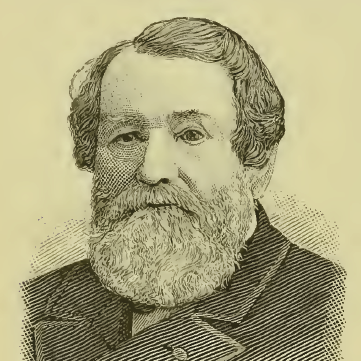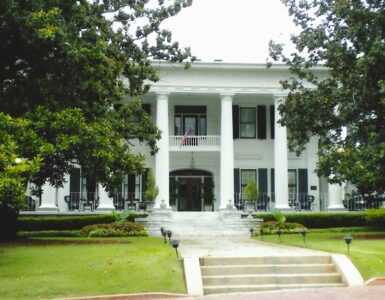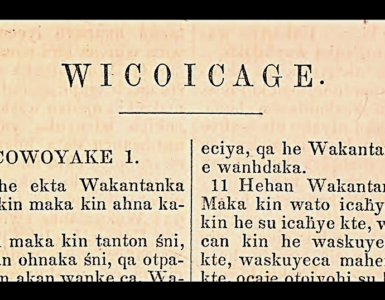This biography is not about a minister but instead tells the story of a Presbyterian layman who was an inventor and industrialist. His life began on the farm as did so many of the lives of antebellum entrepreneurs. Cyrus’s father, Robert, was born at Walnut Grove, Rockbridge County, Virginia, June 4, 1780, into the household of a successful and prosperous farmer. Robert had been keenly interested in the mechanical aspects of agriculture and was a skilled worker of wood and iron which enabled him to improve existing tools and develop new ones. So, when Cyrus Hall was born to Robert and Mary Ann Hall McCormick, February 15, 1809, it was into a home where his thinking was influenced vocationally towards the mechanical tools of agriculture. However, it was also certain that his spiritual guidance would be directed by the Scots-Irish and Old School Presbyterian influences of both his mother and father. A biographer of McCormick, Herbert N. Casson, has described the spiritual influences on Cyrus as having been “nourished on” Calvinism from the time when he “first learned to read out of the Shorter Catechism and the Bible” (158). Casson also notes that from “his father he had training as an inventor; from his mother he had executive ability and ambition; from his Scots-Irish ancestry he had the dogged tenacity that defied defeat; and from the wheat-fields that environed his home came the call for the reaper, to lighten the heavy drudgery of the harvest.” (25)
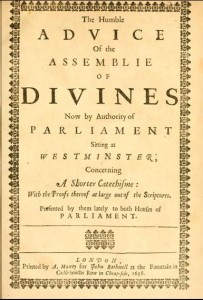 Cyrus invented his first successful machine for reaping grain when he was only twenty-two years of age. It was not perfect, but it was his first step towards alleviating the great number of people and hours of labor necessary for harvesting the fields filled with amber waves of grain. He demonstrated his new machine to his father by harvesting rye on the family farm at Walnut Grove. Cyrus did not seek a patent until 1834 after three years of refining its design to improve the machine’s durability and efficiency. He continued to modify the reaper for another five years while continuing to live at Walnut Grove and use his father’s blacksmith shop. The first two machines he sold were purchased locally in 1840, but by 1843 he had sold about forty reapers in Virginia. His market expanded until by 1845 he was selling reapers in Michigan, New York, Tennessee, Ohio, Illinois, Wisconsin, Iowa, and Missouri. The market had grown greatly in the Midwest, so Cyrus moved his business to Chicago where its production was expanded. The total production of wheat the year McCormick died, 1884, for all nations providing statistical data was 2,240,000,000 bushels. His invention, which was described as having “provided hunger-insurance for the United States and the greater part of the civilized world,” had seen more than a half million reapers manufactured since the first one was sold in Virginia (Casson, 188). McCormick’s reaper and other technological innovations contributed greatly to making America, particularly the Midwest, the breadbasket of the world. McCormick received numerous awards for his agricultural wonder, but his greatest technological recognition may have been the award from the French Academy of Sciences when they said that he had “done more for the cause of agriculture than any other living man.” In 1902, the McCormick Harvesting Machine Company, William Deering’s agricultural equipment company, and three other manufacturers merged to form International Harvester.
Cyrus invented his first successful machine for reaping grain when he was only twenty-two years of age. It was not perfect, but it was his first step towards alleviating the great number of people and hours of labor necessary for harvesting the fields filled with amber waves of grain. He demonstrated his new machine to his father by harvesting rye on the family farm at Walnut Grove. Cyrus did not seek a patent until 1834 after three years of refining its design to improve the machine’s durability and efficiency. He continued to modify the reaper for another five years while continuing to live at Walnut Grove and use his father’s blacksmith shop. The first two machines he sold were purchased locally in 1840, but by 1843 he had sold about forty reapers in Virginia. His market expanded until by 1845 he was selling reapers in Michigan, New York, Tennessee, Ohio, Illinois, Wisconsin, Iowa, and Missouri. The market had grown greatly in the Midwest, so Cyrus moved his business to Chicago where its production was expanded. The total production of wheat the year McCormick died, 1884, for all nations providing statistical data was 2,240,000,000 bushels. His invention, which was described as having “provided hunger-insurance for the United States and the greater part of the civilized world,” had seen more than a half million reapers manufactured since the first one was sold in Virginia (Casson, 188). McCormick’s reaper and other technological innovations contributed greatly to making America, particularly the Midwest, the breadbasket of the world. McCormick received numerous awards for his agricultural wonder, but his greatest technological recognition may have been the award from the French Academy of Sciences when they said that he had “done more for the cause of agriculture than any other living man.” In 1902, the McCormick Harvesting Machine Company, William Deering’s agricultural equipment company, and three other manufacturers merged to form International Harvester.
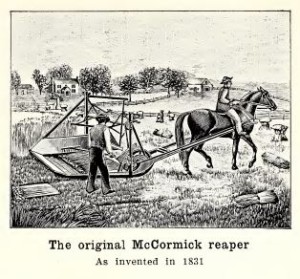 McCormick did not marry until 1858 because he was simply too busy; he often worked as many as fourteen hours a day. However, when he met Miss Nettie Fowler of New York, she changed his mind. During their years of marriage Nettie was his business associate providing advice and assistance concerning the family business. When the Great Fire of Chicago took place in 1871 it destroyed the McCormick manufacturing facilities. Cyrus was faced with a decision regarding the reconstruction of his manufacturing facilities; Nettie convinced him to rebuild the company and she provided assistance and leadership to that end. After Cyrus died in 1884, Nettie became the leading McCormick family representative in the business. The McCormicks had six children. Cyrus became president of International Harvester, Harold was the company treasurer, Stanley was the comptroller, Robert had died in infancy, and two daughters named Virginia and Anita. Nettie Fowler McCormick died in 1923.
McCormick did not marry until 1858 because he was simply too busy; he often worked as many as fourteen hours a day. However, when he met Miss Nettie Fowler of New York, she changed his mind. During their years of marriage Nettie was his business associate providing advice and assistance concerning the family business. When the Great Fire of Chicago took place in 1871 it destroyed the McCormick manufacturing facilities. Cyrus was faced with a decision regarding the reconstruction of his manufacturing facilities; Nettie convinced him to rebuild the company and she provided assistance and leadership to that end. After Cyrus died in 1884, Nettie became the leading McCormick family representative in the business. The McCormicks had six children. Cyrus became president of International Harvester, Harold was the company treasurer, Stanley was the comptroller, Robert had died in infancy, and two daughters named Virginia and Anita. Nettie Fowler McCormick died in 1923.
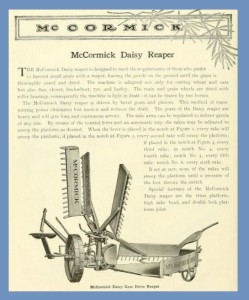 There are two common results of one having invented a life-changing machine like McCormick’s reaper—great wealth and spending a considerable part of that wealth defending patents. Henry Ford, the Wright Brothers, Alexander Graham Bell, and Thomas Edison all prospered financially but consumed considerable time and money defending their patents. Cyrus McCormick also became wealthy and needed the money to fight patent infringement, but as a member of the Presbyterian Church he took a good portion of his wealth and used it to benefit his church’s ministries.
There are two common results of one having invented a life-changing machine like McCormick’s reaper—great wealth and spending a considerable part of that wealth defending patents. Henry Ford, the Wright Brothers, Alexander Graham Bell, and Thomas Edison all prospered financially but consumed considerable time and money defending their patents. Cyrus McCormick also became wealthy and needed the money to fight patent infringement, but as a member of the Presbyterian Church he took a good portion of his wealth and used it to benefit his church’s ministries.
One of the single greatest gifts by McCormick was the endowing of four chairs in the Presbyterian Theological Seminary of the Northwest. The seminary had struggled to exist for several years in different locations but it finally found its permanent location in Chicago thanks to a $100,000.00 gift from the McCormick family in 1859 and a donation of land from other benefactors. Each of the four teaching chairs in the new seminary had several candidates, but in the end N. L. Rice was elected Professor of Didactic and Polemic Theology, Willis Lord was chosen Professor of Biblical and Ecclesiastical History, Le Roy J. Halsey received the most votes for the position of Professor of Historical and Pastoral Theology and Church Government, and William F. Scott was selected by the voters for Professor of Biblical Literature and Exegesis. It might be thought that it would be hard to endow four chairs with $100,000.00, but keep in mind that in 1859 a skilled tradesman like a stone cutter earned $1.50 a day working a sixty-hour week in New York and farmers in Illinois worked the same number of hours to earn a $1.00 a day. In honor of Cyrus, the seminary was named McCormick Theological Seminary in 1886. Other professors from the seminary’s past include, Willis G. Craig, Francis L. Patton, and William L. Breckinridge.
There are extensive archives of material for both Cyrus and Nettie McCormick. Cyrus has been written about as an inventor and businessman, but it might make an interesting thesis or dissertation to get into the correspondence of both Nettie and Cyrus regarding their Christianity, church membership, generosity, and spiritual influences.
Barry Waugh
Standard Presbyterian nineteenth-century sources including titles available about the history of McCormick Seminary were helpful. Some information is from the brief article on McCormick in the 1911 Encyclopedia Britannica. Also helpful was R. G. Thwaites, Cyrus Hall McCormick and the Reaper, 1909. The full title of H. N. Casson’s book is, Cyrus Hall McCormick, His Life and Work, 1909.


